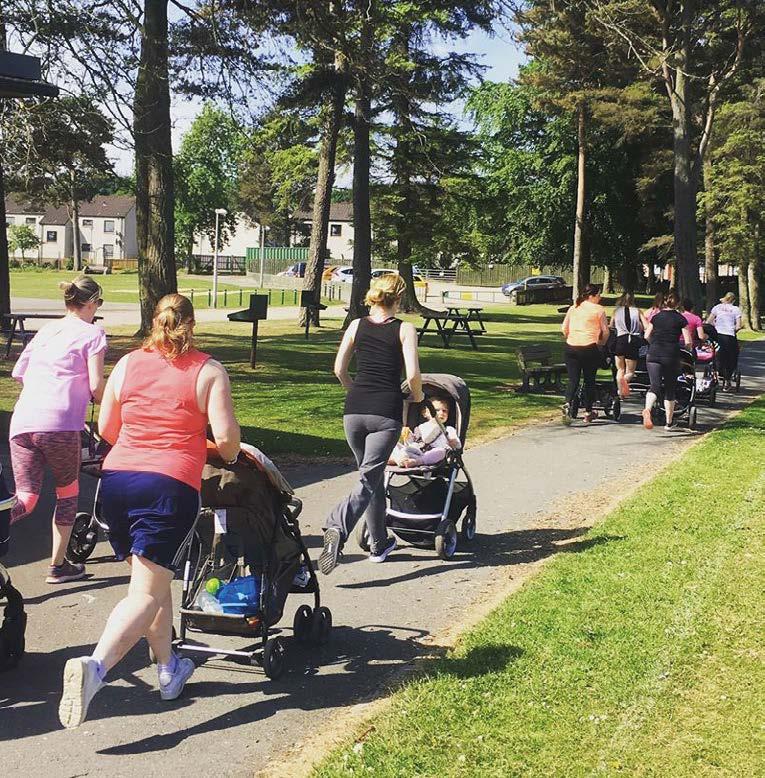
4 minute read
Maternal mental health
By Jess Parson, jog leader
May 6 is World Maternal Mental Health Day. As the day approaches, Jess Parson, jog leader with Mums on the Run Inverurie, tells us how jogging helps her and the mums in her group with their mental welbeing.
Advertisement
I have run since the age of seven, when dad would to take me to the local athletics track. But as I enter my thirties, the reasons why I run seem to be ever changing, not least because of the impact that becoming a mum has had. In January 2017, Finn was born and I’m not sure life has been quite the same since. Running is now more than chasing fast times - it has become an effective way of coping with the pressures of parenthood.

Before baby arrives you have all these ideas of how you think it’s going to be and the reality ends up being so different. Days can seem long and I felt that I had lost some of my identity. It was at this point that I really started to understand the power of running and exercise on mental health. As time went on, I was struggling to juggle work, parenthood and exercise, so I decided to be brave and make a change.
In early 2018 I attended a jog leader course and in May 2018 I set up Mums on the Run Inverurie. I had no idea whether anyone would turn up to the first session but I was delighted to be met by half a dozen women who were keen to find out more. Since then we have welcomed over 100 mums (not all at once!) and new mums are continuing to join us each week. We meet in all weathers and the mums appreciate the benefits of exercise and find that the support of exercising with other mums is hugely motivating and makes you realise you’re not the only one experiencing the battles of motherhood.

The group play warm-up games
I hoped that this group would not only help mums return to running safely (I now have pre- and post- natal fitness qualifications and have good connections with women’s health physios) but also provide them with a place to socialise and exercise with likeminded people. We have created a supportive, encouraging community where mums feel comfortable openly talking about the pressures of motherhood. A Mums on the Run session will vary from week to week but normally includes a fun warm-up game to break the ice, some running/walking intervals and we finish off with some toning to help build up strength in key muscle groups. When it comes to ability, it doesn’t matter, it’s just about getting out and moving, especially on the days where you could happily hide under the duvet.
We have a more structured evening group which has helped lots of mums achieve running goals, from completing their first 5K to entering their first marathon. These evening sessions give you time to concentrate on you, which is important when so much of your time is dedicated to other people.
At the end of last year, the group was shortlisted for the SAMH Mental Health and Wellbeing award and the jogscotland Annual Awards, which acknowledged the impact that this group is having, and I hope to continue to help more mums to improve their mental and physical wellbeing through exercise.
Returning to exercise after having a baby
Are you thinking about going back to running after having a baby?Guidelines recommend you are able to complete the following exercises without any pain, heaviness, dragging or incontinence before you head back to running:
• Walking 30 minutes
• Single leg balance for 10 seconds
• Single leg squat - 10 reps each side
• Jog on the spot for 1 minute
• Forward bounds - 10 reps
• Hop in place - 10 reps each leg
• Single leg ‘running man’ (reverse lunge and drive your knee up on the return) - 10 reps each side

If you do experience symptoms then hold off your return to high impact exercise a wee while longer, continuing with your pelvic floor exercises and short walks.
Guidelines suggest a graded return to running when a woman is 3 months+ post natal as this helps reduce the risk of injury. Recommended:
• Start small. 1-2 mins of running at an easy pace.
• Setting short term goals – a target distance for example.
• Risk factors for injury such as breastfeeding (due to increase in levels of the hormone relaxin) need to be identified and addressed and perhaps a more cautious return considered.
• Building training volume before you build intensity. Walk breaks can be helpful. Couch25K is great for this sort of return.
• Be mindful of heaviness, dragging or incontinence in your pelvic floor area which may suggest that you are exceeding your current training limits. Do not ignore this. Reduce training load and seek professional advice if needed.
• Mild pain which subsides quickly and doesn’t last until the next day is often acceptable, however decisions should be based on the individual and the nature and cause of the symptoms.

